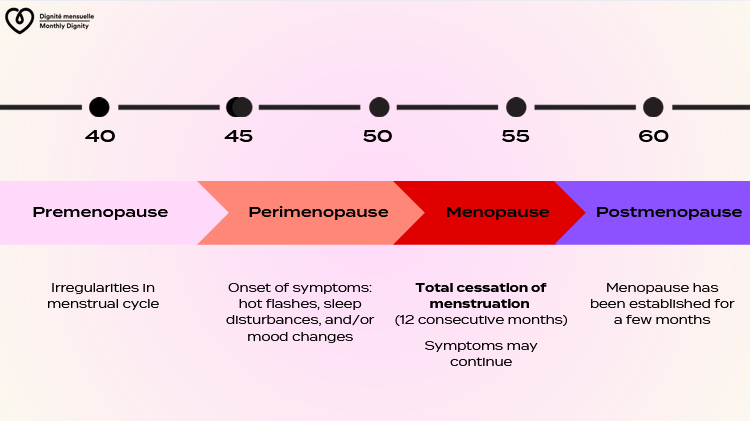Menopause, a natural and inevitable passage in the lives of women, girls, and menstruating people, remains a topic still too often misunderstood and under-researched in our society. This period can bring its share of changes, often unknown or rarely discussed in common knowledge. Many people find themselves navigating this phase alone, only realizing afterward that they are experiencing this important transition.
Today, we have decided to gather knowledge about menopause in this article to facilitate the exchange of information, with the hope that everyone going through this crucial stage can feel better equipped.
Menopause
Menopause is the period in our lives when menstruation stops permanently. It is said that menopause is truly established when periods have been absent for a year, or 12 consecutive months, and it typically occurs at an average age of 52 in Canada (1). According to some observations, it has been noted that the age of menopause could be hereditary! (2,3)
| The word menopause comes from “menespausis,” formed from the Greek mêniaia “menstruation,” mêne “month,” and pausis “end, cessation.” |
We will experience phases of changes that are more or less intense depending on the person: this is what is called premenopause and perimenopause.
During this period, there is a progesterone deficiency that impacts both the body and the psyche. On average, this lasts between 4 and 5 years (ranging from a few months to 8 years). Nearly one in ten people could experience a more abrupt transition, marked by a menstrual irregularity lasting only a few months.
The exact start time is difficult to determine. A study that followed women during their transition to menopause revealed that menstrual cycle irregularities typically appear around the age of 47 or 48 (4). The diagnosis will be made retroactively by observing symptoms over a more or less extended period.

In general, you will first notice irregularities in your menstrual cycles: your periods will tend to come a little earlier with each cycle (i.e., shorter menstrual cycles), and they will be more abundant (due to the drop in progesterone production). The menstrual cycle will shorten by about 2 to 4 days.
| It is important to note that your cycles can also be shorter for other reasons. Don’t immediately assume you’re entering menopause if your cycle shortens slightly in your thirties. As you age, the ovulation phase comes earlier, and the cycle shortens by a few days (5). |
Thus, ovulation will become less regular and harder to predict: “Of the last 10 cycles before menopause, 6 on average are longer and anovulatory (ovulation does not occur)” (6). Although it is more difficult to get pregnant during this period, it is advisable to use contraception during sexual intercourse if you do not wish to become pregnant.
Experiences of premenopause, perimenopause, and menopause vary from person to person. Some may go through this period without experiencing significant symptoms, while others may have severe symptoms that affect their quality of life. Therefore, it is crucial to recognize this diversity and adapt management strategies accordingly.
Symptoms
The symptoms associated with these periods of change are numerous and varied, but here are the most common ones observed in the majority of people (7, 8):
- Irregular periods (duration and heaviness)
- Multiple hot flashes in the same day
- Night sweats and sleep disturbances (difficulty falling asleep and/or waking up in the middle of the night with difficulty falling back asleep afterward). This is one of the symptoms that can have a significant impact on daily life (difficulty staying focused at work, difficulty enjoying moments with loved ones…)
- Brain fog
There are also symptoms and consequences that are discussed much less, including some of the following (9):
- Vulvovaginal dryness and urinary infections
- Different fat distribution in the body leading to “easier” weight gain
- Skin drying and thinning
- Changes in libido (an article awaits you on our website if you want to learn more).
Everyone’s experience and feelings will be different, depending on the person, but in most cases, it will be a combination of several symptoms. It is important to keep this in mind to work on our empathy and continue advocating for the rights of women and menstruators within menstrual equity.
Life Tips and Advice
It is important to note that no scientific consensus has yet been established on the benefits or risks of alternative treatments for menopause symptoms. This field, long neglected, represents a crucial opportunity to advance research and better respond to the needs and choices of the people affected.
We still encourage you to try different forms of wellness practices (meditation, yoga, or cognitive-behavioral therapy) to help manage menopause symptoms.
Each experience will be different depending on the person, but here are some tips that may help reduce some unwanted symptoms:
- Track your symptoms: You can use an app on your phone, or you can do the same thing in a notebook and take notes (symptoms, duration, frequency…). In addition to helping you observe changes in your menstrual cycles, this also provides data to present to your healthcare professional if you have any questions.
- Maintain bone health: With lower estrogen production, your bone health will be important to monitor. With a few simple daily habits, you can take care of it, such as consuming dairy products and foods rich in calcium, exposing yourself to the sun for 15 to 30 minutes a day to promote vitamin D production, or engaging in gentle physical activity, which can also reduce the risk of diseases (10, 11).
- Reduce symptoms: It’s possible to make small adjustments to your diet (12):
- Eat leafy greens (spinach, lettuce…) to help limit hot flashes
- Eat red fruits for vitamin C intake
- Eat chickpeas or dark chocolate for zinc intake
- Eat flax seeds or salmon for omega-3 intake
- Eat seeds, nuts, vegetable oils, or eggs for vitamin E intake
- Also, take the time to identify specific triggers for your hot flashes, such as stress, spicy foods, alcohol, or caffeine, and try to avoid them as much as possible.
- Fight hot flashes: You can try using fans, cooling sprays, or lowering the ambient temperature in your home. Layered clothing can also be a technique to uncover and cover yourself as needed throughout the day. Additionally, drinking water continuously can help with hydration.
- Increase comfort during penetrative sex: Due to vulvovaginal dryness caused during perimenopause, it is recommended to use lubricant to avoid uncomfortable friction or burning sensations.
- Find a community: Emotional support can also be beneficial, so you can join an online or in-person community to share your experiences and advice with others going through menopause. Social support is extremely beneficial for facing the challenges of this life transition. Don’t hesitate to talk about your symptoms and tips with those around you!Finally, among the solutions that may also be offered by your healthcare professional, are hormone replacement therapy, hormonal contraceptives, and bio-identical hormones. We will dedicate a full article to these various methods, in which we will explore their role in managing menopause.
Finally, among the solutions that may also be offered by your healthcare professional, are hormone replacement therapy, hormonal contraceptives, and bio-identical hormones. We will dedicate a full article to these various methods, in which we will explore their role in managing menopause.
When to consult a healthcare professional
Consult a healthcare professional when you feel the need, but here are some symptoms and/or conditions that may alert you:
- Dark thoughts or sudden mood changes
- Bleeding between periods or unusual pain
- Discharge or bleeding after being fully menopausal
- Any symptoms that greatly impact your quality of life and daily routine
- A family history of uterine cancer or PCOS
Menopause, often perceived as a difficult stage in life, can be an opportunity to reinvent oneself and rediscover personal well-being. By approaching this transition with appropriate information, adequate support, and healthy lifestyle choices, every woman or menstruator can navigate this period with serenity and strength. It is essential to break the taboos and open the conversation about menopause so that everyone affected can feel heard, supported, and fulfilled throughout this new chapter of their life.
List of Useful Resources
Here are some resources you can consult online to delve deeper into the topics we’ve covered here:
| MenopauseandU – SOGC Am I in menopause? – SOGC Menopause and Perimenopause – CLUE Menopause Videos – Mindology Menopause – WHO Menopause – Inserm Menopause – VIDAL Menopause – Merck Manual |
It is important to note that this article reflects the current information and findings available at this time. Research on menopause is underfunded, and the conclusions are recent. Therefore, new knowledge may be added to the information outlined in this article.


